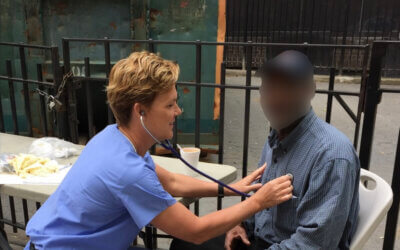Congestive Heart Failure: The 10 Most Important Tips to Avoid the Hospital
Avoiding unwanted hospitalizations is the primary goal of hospice care. Here are 10 ways families and caregivers can help keep heart failure patients out of the emergency room.

Congestive Heart Failure (CHF): What is it?
Before understanding the best ways to reduce the risk of an unwanted hospitalization, you first must understand a disease. Heart failure, also known as congestive heart failure (CHF), is not something that occurs suddenly like a heart attack. Heart failure is a condition that develops gradually over time. The heart keeps pumping, but it’s not pumping blood throughout the body as efficiently as it once did. Congestive heart failure may involve one part or multiple parts of the heart. There are many symptoms to look out for, according to the Mayo Clinic.
While CHF may shorten lives, a good care plan implemented by a team of clinicians, caregivers, and the patient themselves, can extend and improve the quality of life. Chapters Health System has a continuum of care suited toward CHF patients. Vice President of Medical Services, Dr. Stewart Stein, explains them in the following video:
While a team of trained nurses, nurse practitioners and doctors can certainly help, there are several simple things caregivers and patients can do at home. With that in mind, here are the top 10 tips to avoid hospitalizations for CHF.
1. Limit Fluids
You always hear people say “drink plenty of fluids” when you’re battling a cold or the flu. Being well hydrated is typically sound medical advice, but in this case, you need to be careful. Many congestive heart failure patients suffer from edema, which is swelling as a result of fluid retention. The swelling can appear in the legs, ankles and occasionally the abdomen. Limiting your fluids could help reduce this symptom. In addition, fluids can build up in the lungs of CHF patients. To avoid it, ask your doctor how much fluid you should drink each day and stick to it.
2. Weigh Yourself Daily
It’s always important to document weight changes and report them to the care team. Changes in weight can indicate fluid buildup or other complications. Keep a notebook to document the weight changes and any other symptoms. Notify your care team if you notice a weight gain of two pounds overnight or three pounds in one week.
3. Exercise and Activity
This is a double-edged sword. You should try to remain active, but exercise can help and hurt a patient with congestive heart failure, depending on the activity. According to studies documented by the Preventative Cardiovascular Nurses Association, some heart failure patients reported an 11 percent reduction in hospitalizations when light exercise is introduced into their care plan.
Light exercise can include walking for several minutes each day, which can help increase strength and reduce leg swelling. However, don’t do it if the activity causes extreme tiredness or shortness of breath. Find a balance and rest completely between each activity.
4. Reduce Sodium
It’s one of the most common ways to improve your heart health. For CHF patients, a heart-healthy diet that’s low in sodium can lower blood pressure, improve tissue health of blood vessels, and reduce fluid levels in the body and stress on the heart.
According to the CDC, more Americans need to reduce their sodium intake. The agency says about 90 percent of Americans two years old or more consume too much sodium per day. The agency also estimates reducing average population sodium intake to 2,300 milligrams per day may save $18 billion in healthcare dollars.
Focus on fresh foods to lower your sodium levels. Fresh fruits, vegetables, whole grains and dairy products are on the list. Avoid processed or canned foods.
5. Maintain a Healthy Environment
Simply maintaining a healthy environment can help manage symptoms. Take steps to reduce dust and humidity in your living area. This can help if the patient is having trouble breathing. Elevating the head and shoulders with pillows or sitting upright can help as well. Turn on a fan or ask your doctor about using supplemental oxygen if shortness of breath continues to be an issue.
This should be obvious but avoid people with colds or the flu. While those illnesses can by mild for a healthy person, they can introduce serious complications for a CHF patient. These conditions put extra demand on the heart and lungs.
6. Sleep Well
Getting a good night’s rest is very important. Sleep reduces the heart rate and the workload. Sleep disorders are regular linked to prognoses for heart failure patients. If you or your loved one are not getting enough sleep, try the following:
- Introduce light exercise into the care plan
- Limit or eliminate alcohol intake
- Avoid caffeine
- Develop a pre-bedtime routine such as a warm bath, diming lights or herbal tea
- Manage sleep apnea with a Continuous Positive Airway Pressure machine, or CPAP, which can help lower blood pressure and reduce stress on the heart.
7. Dress for (Heart) Success
Avoid tight socks or stockings, such as thigh-high or knee-high hose, which slow blood flow to the legs and cause clots. Avoid temperature extremes as much as possible too. Dress in layers if it’s cold outside, so that you can add or remove garments as needed.
8. Stick to Your Prescriptions
A doctor may prescribe several different medications to manage symptoms, depending on the stage of the disease process. Sometimes you may feel you no longer need to take a certain medication or you’re not taking enough. Don’t make any decisions just yet. Talk to your doctor first. Taking too much or too little of a certain medication can have serious effects on your condition, leading to hospitalization. Also, set up reminders to stay on track with a prescription if you live alone.
9. Consider Home Monitoring Devices
Like many healthcare organizations, Chapters Health has adapted during the COVID-19 pandemic to provide at-home monitoring devices, which allow patients (and families) to monitor their conditions and report daily updates to their care teams. Those devices include blood pressure cuffs, pulse oximeters, glucose monitors and scales.
A report from USA Today shows how Chapters Health has used those technologies to improve outcomes among home health patients.
10. Seek Support
At Chapters Health, there are resources to help caregivers and patients deal with the emotional and spiritual stress that comes with a life-limiting illness. Social workers, chaplains and bereavement specialists can guide you on ways to relax and reduce anxiety.
Chapters Health System is committed to serving the needs of its patients, families, caregivers, health providers, partners and communities. For more information, please call our helpful Chapters Health and HospiceHelp24® team at 1.866.204.8611 or Contact Us.
5 Comments
Leave a Reply
Keep Exploring

















D. B. Melvin
April 9, 2022 at 3:30 amGreat information, it was very informative.
Casey Mashburn
September 19, 2022 at 10:47 amI’m looking for a heart failure support group, whether online or in person. Can you tell me what group(s) are available in the Towson, MD area?
Ken Murphy
September 23, 2023 at 2:41 pmThank you for the information. It was helpful.
Cat Jackson
December 9, 2023 at 9:00 amThis list helped me educate my stubborn 77yr old Grandmother. Thank you very much.
Tansela Reaves
February 14, 2024 at 9:47 amThanks for the information I will include this in my daily routine.